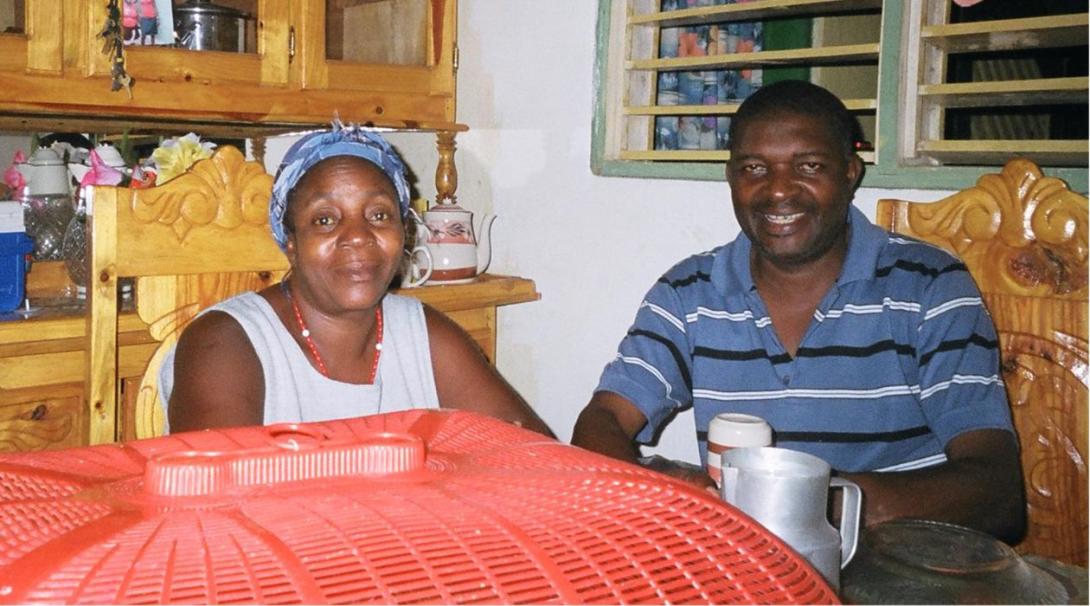
© Photo provided by Carlos Freire.
Wilfred and Asimene Joachin.
It is difficult to watch the reports coming out of Haiti, as the country spirals into utter lawlessness. Reporters for a major news agency are filing their stories from the town of Dajabón, on the northern border of Haiti and the Dominican Republic. I immediately recognized the location as the point through which I, with three companions, entered the poorest country in the western hemisphere.
Once across the border, the few paved streets near the customs building–a transformed shipping container at the time–soon disappeared and we were driving on unpaved and uneven roads–and across rivers–that led us towards the hills of Haiti’s Northeast Department, the poorest area in the country. We were there, my companions and I, to visit the community of the Focolare Movement in Carice and Mont-Organisé. It was 2010.
The involvement of Focolare in that region began around 1982, when a team of Sisters of Mary Immaculate arrived in Carice and Mont-Organisé and introduced the spirituality of unity there. At about the same time, De La Salle Brother Richard Dupont had introduced the spirituality of unity in the northwestern city of Port-de-Paix, where he organized a Mariapolis gathering in 1989. A group of twenty people made the challenging 200 km (120 mi) trip from Mont-Organisé in order to participate in that Mariapolis. Among the participants was Wilfrid Joachin, 27 at the time, who today, with a group of close friends, is responsible for all the activities of the Focolare Movement in the Department of the Northeast.

©Photo provided by Carlos Freire
The 6 a.m participants.
By the time I visited, 21 years later, they had organized and created an association(PACNE) that assists the local population in very concrete ways. PACNE (Program Action Contre la Pauvreté du Nord Est) was founded in 1995 and carries out much work with the participation of large numbers of people. They manage an international sponsorship program that funds the education of children in the area and provides extra income for their families. A small cooperative that brings together 350 local farmers provides mini-loans so that they can purchase seeds and cultivate a tiny vegetable garden for their own consumption; it also educates them in the implementation of more productive methods of farming. PACNE has also built a rice and cassava mill, where people can process their produce into cassava bread and rice ready for sale or for their own consumption.
This past Christmas, the local coordinators reported that “Haiti is being hit by an increasingly harsh crisis. One can hardly imagine that it could get worse still, but that is the fact. The capital is 80 percent controlled by bandit gangs. But insecurity is also increasing in other parts and even in the Northeast where most of our community is concentrated. There are also problems with the Dominican Republic with which Haiti shares the island of Hispaniola. Life is
becoming more and more expensive and resources are running out,” and in spite of their best efforts, “some families go days without eating. Fortunately there exists among our families a solidarity that helps in extreme situations.”
My time in Carice and Mont-Organisé flew by, but it has marked my soul indelibly. It was moving and uplifting to see how the spiritualty of unity lived out can create solidarity among large groups of people. We held a gathering one morning, at around 6:00 AM. Several hundred people attended, some of whom had walked for over an hour to be present. How can I ever forget the sight of these ones arriving on foot, singing and rejoicing?
In the darkness that envelops Haiti, there is a light that shines dimly, perhaps, but steady, a tiny beacon of hope for this tortured land.
If you wish to support the work of PACNE, visit www.focolare.us, click on the “give” button and scroll to “PACNE (Haiti)”.













